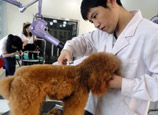
Edited and translated by Liang Jun, People's Daily Online
As to the definition of deep space, there are slightly differences among different countries.
Despite the various definitions, exploration of deep space mainly includes research and observation of the solar system space, except Earth, all planets and their satellites and small celestial objects (asteroids and comets).
Why we study the space since we cannot solve all the problems on Earth? The question was often raised to Ye Peijian, chief designer of Chang'e-1, China's first moon probe, and chief commander of the Chang'e-2 and Chang'e-3 missions.
The most important reason is resource, Ye explained. There are four major resources in space: high position resource, environmental resource, material resource and information resource, which are all closely related with people's lives.
Compared to the environment on Earth, space environment features high purification and microgravity, which are greatly conductive to pharmacy, metallurgy and other areas, according to Ye. The capability of probe to deep space is a symbol of a country's political, economic and technological power. In a sense, the country that occupies the space dominates the world.
Ye believes exploration to deep space will have significance on understanding the formation of the universe, the evolution of the solar system and the terrestrial life. Besides, it can answer a series of questions including origin and evolution of Earth, formation and evolution of the planets and the solar system, whether human being is the sole life or not in the universe as well as the future of Earth.
Furthermore, exploration to deep space can generate economic benefits, according to Ye. The U.S. Appollo program created over 800,000 employment opportunities and attracted more than 20,000 high-tech enterprises from dozens of industries, which greatly enhanced scientific and technological innovation and rapidly development of society.
Through the program, more than 30,000 patents in the fields of computer, new materials and medical treatment were obtained. About 1,000 of these patents were quickly transformed to productivity, among others, digital cameras, sunglasses and bacteria-free rooms are still widely used now in our daily life.
Exploration to deep space can also enhance national self-confidence and cohesion. An old overseas Chinese had said emotionally that their heads can rise as high as the Chinese satellites fly, said Ye.
Read the Chinese version: 中國航天:探月之后還探啥
Source: People's Daily; Author: Jiang Jianke and Yu Siyi
















 Fishing fleet sets sail for Nansha Islands
Fishing fleet sets sail for Nansha Islands


![]()
